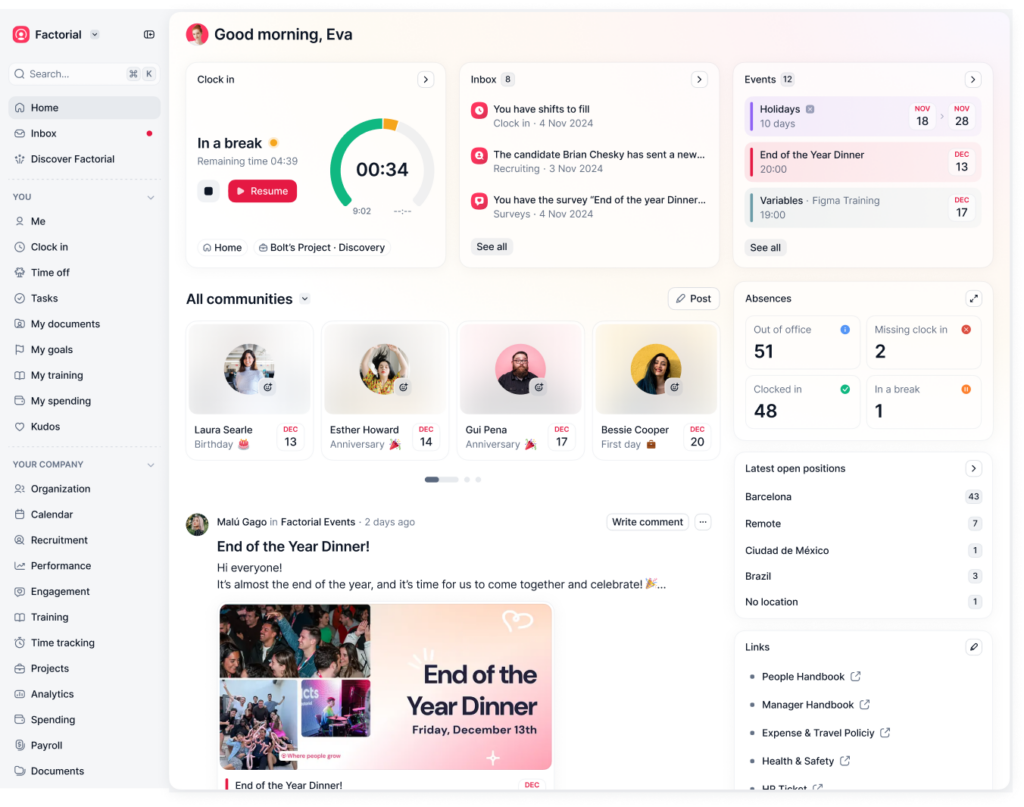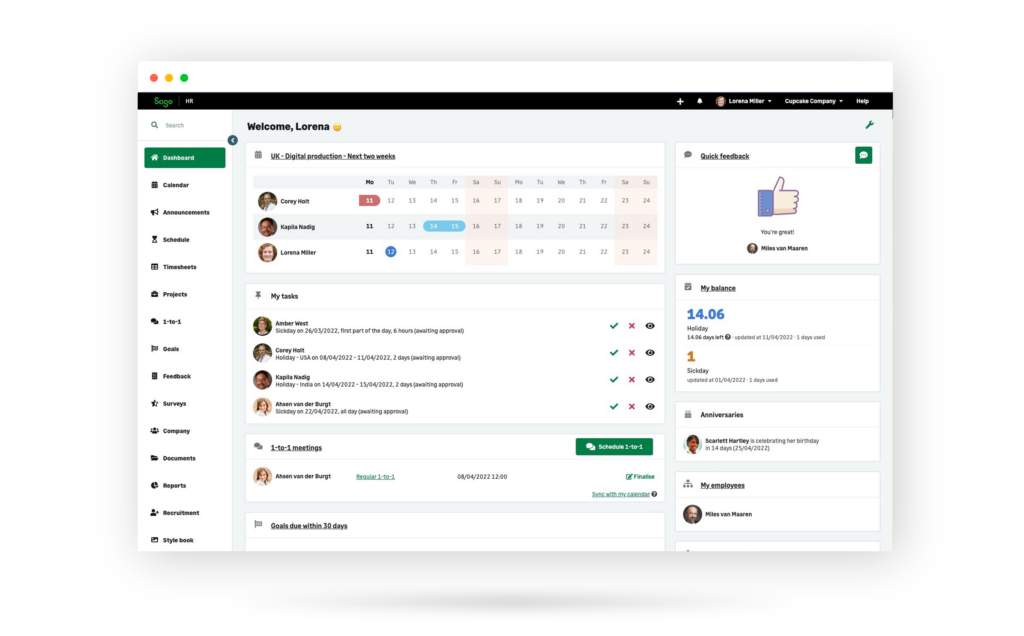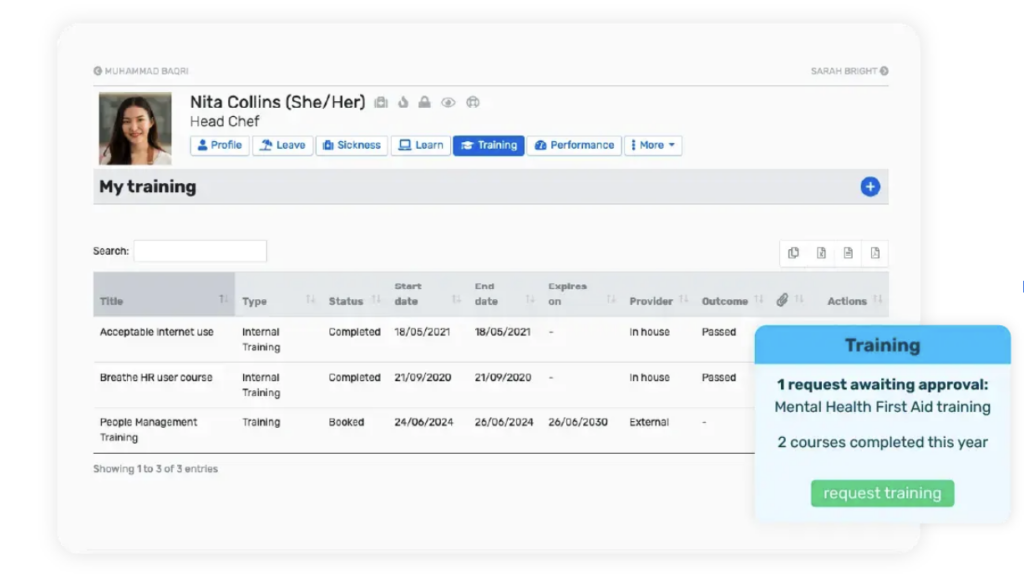Workday is a well-known HR platform; however, many SMEs may struggle with its complex interface. If you’re looking for an effective business management software without a long implementation process or steep learning curve, this is the guide for you. In this article, we’ll show you the main features and limitations of Workday. Additionally, we provide an overview of the 3 best Workday alternatives in 2026.
Let’s check out the best alternatives to Workday to see which platform will fit your business needs the best. To get a quick comprehensive overview, click here for our comparison chart.
Workday Overview
Workday helps digitize companies’ internal processes from managing time off requests to organising employee data and company documents. Additionally, its platform offers customisation and automation to free up your team’s time. Workday offers numerous features, including:
- Payroll
- Employee self-service portal
- Analytics and reporting tools
- Recruitment and hiring features
- Time tracking
- Performance management
Its robust software allows companies to manage every aspect of their business from one platform. From an interactive organisational chart to mobile access and workforce management. Although this platform provides lots of advanced features, it may not be well-suited with your company. The HR software market has plenty of other options to choose from.
Workday Limitations
While Workday is a great option for some SMEs and large enterprises, it has some limitations. You may find a more comprehensive HR solution that better matches your needs. Workday’s limitations include:
- Clunky interface: Its platform can be hard to navigate as it has an outdated interface, making it challenging for new users to use.
- Long implementation process: Implementing and adopting Workday requires time and commitment. You will need to receive extensive training before you can start using the platform autonomously.
- High costs: Its high price point compared to other Workday alternatives makes it hard for SMEs to justify its cost.
- Underdeveloped features & customisation: Some key features, such as their onboarding process, are underdeveloped and not sufficiently customisable, which requires more manual work for users.
- Limitations for specific industries and international markets: Workday does not adequately support non-standard working hours and international regulations, making it best suited for the U.S. market rather than for UK employers.
Best Alternatives to Workday in 2026
1. Factorial: Business management software for all companies

Factorial is the all-in-one business management software designed to meet the needs of small and medium-sized enterprises. This cloud solution offers companies a complete HR platform to enhance your company’s efficiency. From one platform, you’ll have all the core HR functions – recruiting, onboarding, time tracking, and more. With Factorial, you can simplify and reduce the amount of time-consuming admin tasks you need to complete. Its user-friendly interface and wide range of automations adapt to the specific needs of each company, making it perfect for any company. Factorial’s features include:
- Monitoring attendance and working hours
- Manage holidays and absences
- Onboarding tools that make processes smoother
- Creating HR reports and detailed analyses
- Controlling business expenses
- Conducting performance appraisals
- Payroll processing
- Automating administrative tasks
- …and much more
One of its greatest strengths is its mobile app, which offers a complete experience even on smartphones: a competitive advantage that few other tools on the market can guarantee. Used in over 40 countries, Factorial offers an affordable entry plan, perfect even for smaller businesses. You’ll be able to customize which modules are most important to your company, ensuring you are only paying for what you need.
👉 Request a free demo and discover all the features and benefits Factorial can bring to your company.
2. Sage HR

Sage HR is an HR management platform that is primarily targeted towards small and mid-sized companies. It includes key features like talent management, workforce planning, and advanced analytics. Your team will be able to automate their HR processes easily with Sage’s unified system. However, Sage’s user-friendly platform doesn’t provide every feature, such as rota software and expense management. They are available at an additional fee, which could deter UK employers from choosing this Workday alternative.
3. BreatheHR

There’s a reason why BreatheHR is a top Workday competitor. It provides advanced features for HR teams to automate and reduce their workload. It offers online training courses to upskill and reinforce key competencies in your team. Additionally, you can monitor their training progress, manage your workforce, and recruit new team members. BreatheHR provides advanced analytics to measure key KPIs from employee engagement, time-to-hire, and company spending. You have additional modules, such as rota management and expenses, that are available for an additional fee.
Top Workday Alternatives Comparison Chart
Here’s a chart to get a quick overview of each platform’s features and prices at a glance.
| Feature | Workday | Factorial | Sage HR | Breathe HR |
|---|---|---|---|---|
| Ease of Use | Powerful but complex, steep learning curve | Modern, intuitive, simple setup | User-friendly, moderate setup | Very simple, but limited features |
| HR Management | Enterprise-level HR suite | Robust employee records, org charts, custom workflows | Solid HR core | Basic HR records |
| Time Off & Attendance | Advanced but complex | Highly customisable, automated approvals, calendar sync | Basic leave tracking | Simple leave requests |
| Performance Management | Enterprise-grade performance tools | Goal tracking, 360° feedback, reviews | Review forms, limited feedback | None |
| Onboarding & Offboarding | Comprehensive, but heavy setup | Automated workflows, e-signatures, task lists | Templates for onboarding | Very limited onboarding |
| Document Management | Strong but enterprise-heavy | Unlimited e-signatures, centralized hub, GDPR tools | Limited e-signature options | Simple document storage |
| Reporting & Analytics | Advanced predictive analytics | Real-time dashboards, compliance reporting | Custom reports | Limited reporting |
| Integrations & API | Extensive enterprise integrations | Broad integrations (Slack, Teams, Google, payroll tools) + Open API | Fewer integrations, limited API | Limited integrations, no API |
| Compliance & GDPR | Global compliance tools | Strong UK/EU compliance, audit trails | GDPR-ready | GDPR-ready |
| Pricing | Must contact Workday for a quote. | Plans start at £5.40 per employee per month. Check out more about Factorial’s pricing structures. | Starts at £4.60 per employee per month. Features like performance management and expense are extra fees. | Starts at £22 per month per business (up to 10 employees). |
Choosing the Best Workday Alternative
When it comes to investing in the top alternative to Workday, it’s best to think about what’s best for your HR team. Ask yourself if the platform has an intuitive interface, if it provides transparent pricing options, or if it offers all the HR tools you’re looking for. When you understand your business needs, you’ll be able to make an informed decision about which HR management tool to invest in. Ultimately, you want to automate your HR processes and reduce the amount of tedious and repetitive admin tasks your team does.
Factorial is a clear winner as it offers HR solutions for all your needs. From customisation, payroll processing, to tracking employee performance. You have all the tools you need with Factorial, your go-to all-in-one solution. Its user-friendly interface gives it a modern touch that allows even your least tech-savvy employee to navigate it with ease.
👉 See Factorial in action! Get your free demo to uncover all of Factorial’s features.
The information presented on this page is based on publicly available sources and not limited to breathehr.com, sage.com, workday.com, G2 public reviews, Capterra public reviews, and trustpilot public reviews. The comparisons between Factorial and other providers, are intended solely for the illustration of the respective software features, pricing and functionalities. All information regarding features, prices, and integrations may be subject to change without prior notice. Factorial assumes no liability for the accuracy, completeness, or timeliness of the information presented. We recommend contacting the respective providers directly to obtain the most accurate and up-to-date information. All legal regulations regarding spanish fair advertising and competition law are fully observed by us; if you have any concerns, please reach out to us. The comparisons presented do not constitute a final evaluation or recommendation for any provider, but serve solely as an informational source.


